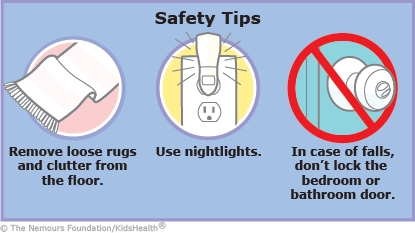Kids with dizziness may feel lightheaded or off-balance. Dizziness usually goes away on its own. When your child is dizzy, you can help prevent injuries from falls.



Your child:

Your child:

What does dizziness feel like? Dizziness can be a woozy feeling like being off-balance or feeling lightheaded. Dizziness also can be a spinning feeling called vertigo. The feeling may be constant or come and go. Vision or hearing problems, nausea, headaches, or tiredness may happen along with the dizziness.
Young kids who can't describe these feelings might vomit, look pale, be irritable, not want to move, walk unsteadily (with feet wide apart), or have twitching eye movements.
Why does dizziness happen? Nerves and other parts of the inner ears work with the brain, eyes, joints, and muscles to keep us steady and upright. Dizziness happens when one or more of these aren't working well. Dizziness can be triggered by infections, low blood pressure, low blood sugar, migraines, or ear problems. Dehydration, anemia, anxiety, and hyperventilation can also cause dizziness.
How do health care providers treat dizziness? Health care providers do an exam to see what's causing the dizziness. Treatment will depend on what they find. In most cases, dizziness eventually gets better on its own. If dizziness continues, medicine, physical therapy, or surgery might help manage symptoms. Sometimes, special testing is needed.